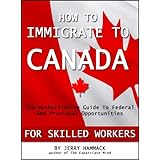Attorney David Cohen's Canada Immigration Newsletter has an article that will be of interest to anyone applying for Permanent Residence through the Canadian Experience Class. In it he points out that, as with all immigration applications the devil is in the details.
On first glance, the process for a candidate wishing to convert from temporary to permanent resident status appears simple. Skilled workers with good English or French ability intending to reside outside Quebec might think that their positive eligibility for the program makes attaining permanent residence a certainty. The reality, however, is that there have been a growing number of refusals handed out to individuals due to minor discrepancies in their applications. Unfortunately, these people do not become permanent residents of Canada.
While the article deals with Canadian Experience Class applications, the same advice of getting the details right pertains to all immigration applications. In the case of a family class application for instance; if you say you and your partner travelled to Hawaii together in 2013, but the photos you submit are date-stamped 2011, that might cause you a problem. If you claimed to have worked in a certain profession for over a year, but can only produce 9 months worth of payslips, that will cause you a problem.
The bottom line is that the statements of fact that you put on your application have to be supportable by evidence. That's why the gathering of supporting materials for an application is one of the most difficult and critical steps in applying for permanent residence.
Read the rest of the article here.
On first glance, the process for a candidate wishing to convert from temporary to permanent resident status appears simple. Skilled workers with good English or French ability intending to reside outside Quebec might think that their positive eligibility for the program makes attaining permanent residence a certainty. The reality, however, is that there have been a growing number of refusals handed out to individuals due to minor discrepancies in their applications. Unfortunately, these people do not become permanent residents of Canada.
While the article deals with Canadian Experience Class applications, the same advice of getting the details right pertains to all immigration applications. In the case of a family class application for instance; if you say you and your partner travelled to Hawaii together in 2013, but the photos you submit are date-stamped 2011, that might cause you a problem. If you claimed to have worked in a certain profession for over a year, but can only produce 9 months worth of payslips, that will cause you a problem.
The bottom line is that the statements of fact that you put on your application have to be supportable by evidence. That's why the gathering of supporting materials for an application is one of the most difficult and critical steps in applying for permanent residence.
Read the rest of the article here.


No comments:
Post a Comment